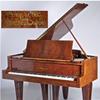The Arts Get a Small Slice in $2 Trillion U.S. Stimulus Package
- March 26, 2020 20:49
On Wednesday night, the arts industry was designated small relief for coronavirus (COVID-19) economic fallout with the U.S. Senate unanimously passing a $2 trillion total emergency stimulus package for the nation. The House is expected to vote Friday (update: it has passed). (More on the package.)
With an untold number of performances, exhibitions, and events wiped off the spring calendar since mid-March, along with museum and gallery closures and related impacts, America's over $800 billion arts and culture sector has already witnessed devastating economic losses in the multibillions, just at the start of the pandemic in the U.S.
Arts groups had asked for at least $4 billion from Congress. U.S. museums are losing an estimated $33 million a day as a result of coronavirus, according to the American Alliance of Museums.
Americans for the Arts, among the industry advocates, breaks down the arts-related funding in the bill:
Federal Arts Funding (Note: This is a supplement to their annual appropriations)
- $75 million for the National Endowment for the Arts
- $75 million for the National Endowment for the Humanities
- Special note: Congress accepted advocacy to waive matching grant requirements and to waive the requirement for grants to be project-specific. All these new fast-track grants will be for general operating support with no match.
- $75 million for the Corporation for Public Broadcasting
- $50 million for the Institute of Library and Museum Sciences
- $25 million for the Kennedy Center
- $7.5 million for the Smithsonian
Community Development Block Grants, Small Business Administration, and Unemployment Insurance
- $5 billion for Community Development Block Grants to cities and counties. Arts groups should work directly with their mayors and local economic development offices for grant support.
- $350 billion for Small Business Administration (SBA) emergency loans of up to $10 million for small businesses—including nonprofits (with less than 500 employees), sole proprietors, independent contractors, and self-employed individuals (like individual artists)—to cover payroll costs, mortgage/rent costs, utilities, and other operations. These loans can be forgiven if used for those purposes;
- $10 billion for Emergency Economic Injury Disaster Loans (EIDL) for loans up to $10,000 for small businesses and nonprofits to be used for providing paid sick leave for employees, maintaining payroll, mortgage/rent payments, and other operating costs;
- Expanded Unemployment Insurance (UI) that includes coverage for furloughed workers, freelancers, and "gig economy" workers. The bill also increases UI payments by $600/week for four months, in addition to what one claims under a state unemployment program.
Charitable Giving Tax Deduction
- An "above-the-line" or universal charitable giving incentive for contributions made in 2020 of up to $300. This provision will now allow all non-itemizer taxpayers (close to 90% of all taxpayers) to deduct charitable contributions from their tax return, an incentive previously unavailable to them. Additionally, the stimulus legislation lifts the existing cap on annual contributions for itemizers from 60 percent of adjusted gross income (AGI) to 100 percent of AGI for contributions made in 2020.
Another stimulus package should be in the pipeline as the country continues to deal with the economic fallout from the coronavirus and more advocacy is needed for the arts. On Thursday, the U.S. had the highest number of COVID-19 cases in the world. Over 160 million Americans have been issued orders to stay at home.
In a different response, the German government has approved €50 billion ($54 billion) for its arts and creative industries. “We know the hardships, we know the desperation,” said culture minister Monika Grütters in a statement. “The cultural sector in particular is characterized by a high proportion of self-employed people who now have problems with their livelihoods.”
Americans for the Arts and the Arts Action Fund is collecting information on continuing damages to the U.S. arts industry through a national economic snapshot survey and dashboard, and offers up-to-the-minute COVID-19 Resource Center updates.





















